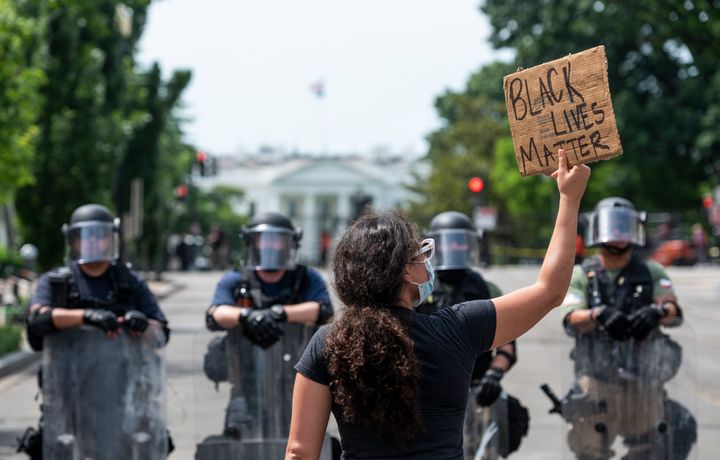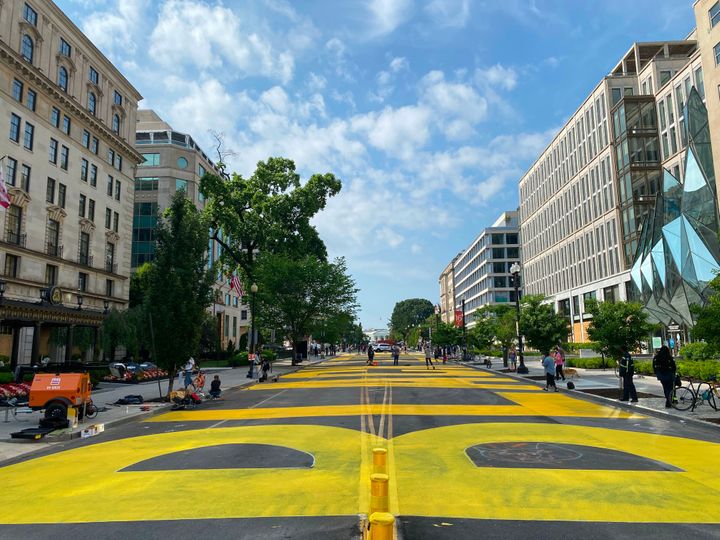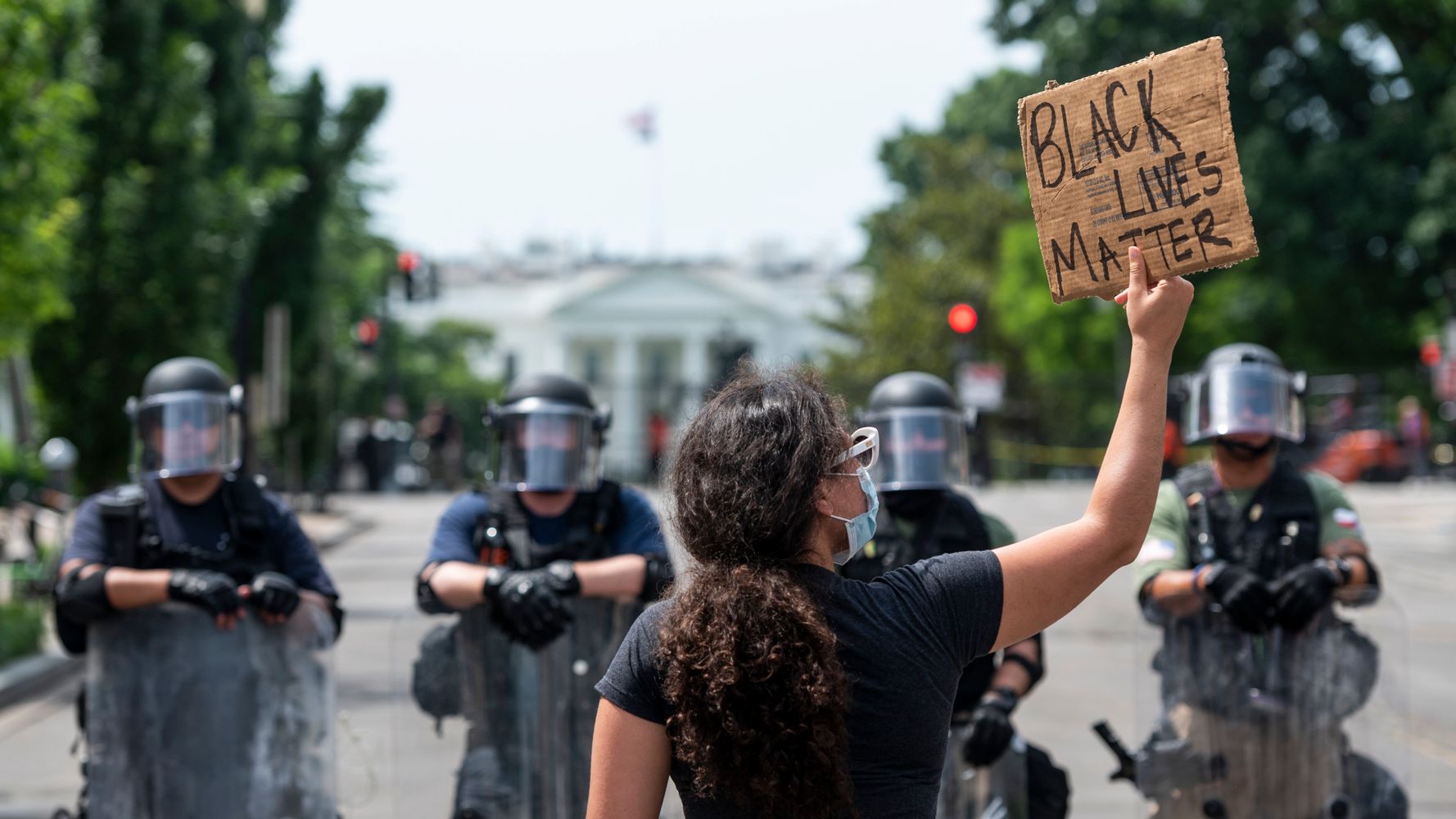[ad_1]
The District of Columbia faced an overwhelming federal law enforcement presence this week as its residents protested police brutality against Black people. And the district could do little to stop it, thanks to politically motivated opposition to granting statehood to the majority Democratic city — with its plurality of Black residents — or giving it voting members in Congress.
Residents of the district have pushed to be admitted to the Union as a state as far back as Frederick Douglass. The famed writer and abolitionist called the city “the one spot where there is no government for the people, of the people, and by the people” and said its people, “are relegated to the position of neuters.” Even then, Douglass’ call for D.C. statehood was linked to the issue of race, as thousands of freedmen and women had fled to the city during and after the Civil War.
Since then, district residents have been subjected to countless indignities over the years. More than 700,000 residents lack any voting representation in Congress. Racist lawmakers in Congress were able to impose segregationist and discriminatory policies on the district in the 1930s and ’40s.
More recently, Congress blocked laws passed by the locally elected district government. It blocked abortion funds in 1988, domestic partnership benefits for same-sex couples in 1992, clean needle exchanges in 1996 and the legalization of marijuana in 2014. Residents have seen these intrusions as acts of racial paternalism by white lawmakers acting as if a Black municipality could not govern itself.
But since the passage of the District of Columbia Home Rule Act in 1973, the city had not seen itself occupied by the federal government against its wishes until this week. That action is prompting renewed calls to make the district the 51st state or at the very least to finally take action to give local officials authority over the deployment of the National Guard and to restrict the president’s ability to seize control of the local police force.
Federal forces deployed by President Donald Trump and under the direction of Attorney General Bill Barr violently dispersed a peaceful protest on district streets on Tuesday.
Military helicopters harassed fleeing protesters by flying below the height of buildings over the streets of Chinatown. And on Wednesday, a phalanx of federal forces — some appearing to violate district law by not bearing identification — occupied streets far from federal land immediately in front of the White House.

“This is the only place in the United States where this can really happen in this way,” said Bo Shuff, executive director of D.C. Vote, a pro-statehood group. “We have seen just immense federal force come into the district, unrequested by local law enforcement, unrequested by the mayor, and some of the examples have been egregious.”
Since the district is not a state, its elected officials have little or no say over the deployment of federal troops, the National Guard or prison guards on their streets. The president can seize control of the Metropolitan Police Department if he wants.
“People have to understand the root cause and be willing to do something about the root cause,” Washington Mayor Muriel Bowser, a Democrat, said at a Thursday news conference in response to questions about whether residents felt they were under an unwanted occupation.
“We’re more than 700,000 taxpaying Americans who don’t have full representation in the Congress and don’t have full autonomy,” Bowser said. “And so until we fix that, we are subject to the whims of the federal government. Sometimes they’re benevolent, and sometimes they’re not.”
Bowser sent a letter to Trump asking that he remove all federal forces from Washington on Thursday.
Washington’s population currently exceeds 700,000. Until 2011, the majority of its residents were Black; they now represent 46% of the population. Supporters of statehood point out that the city’s population is larger than that of Wyoming or Vermont, each of which has a majority of white residents.
“If we insist that D.C. statehood is a discussion about race ― we don’t run away from that; we, in fact, embrace that,” Rep. Gerry Connolly (D-Va.) told D.C. Vote on Thursday, “I believe that in the aftermath of George Floyd’s murder, there’s a more receptive atmosphere to reexamining the issue of D.C. statehood in that context.”
There are currently three bills in the Democratically controlled House of Representatives that would either completely rectify the root cause of the district’s problems or ameliorate some of its worst ones.
Washington’s nonvoting House delegate, Eleanor Holmes Norton (D), introduced a landmark statehood bill. The bill would turn a two-mile section of downtown Washington — encompassing federal buildings from the White House to the Capitol and federal land including the National Mall — into the Federal District. It would also turn the rest of the residential and commercial city into the state of Washington, Douglass Commonwealth. The House Committee on Oversight and Government Reform has already held hearings on the bill.
District voters approved statehood in a near-unanimous vote on a 2016 ballot initiative.
Norton also introduced bills that would strip the president of the authority to seize control of the Metropolitan Police Department and empower the mayor to call up the National Guard without the president’s permission.
The federal occupation of district streets could well push Congress to act on all of these fronts.

House Majority Leader Steny Hoyer (D-Md.), who only endorsed district statehood in 2019, had promised a vote on Norton’s statehood bill this year. He said on Wednesday this was even more necessary after Trump’s deployment of federal forces into the city.
“President Trump’s behavior in the District of Columbia in recent days, as well as his threats to impose his dangerous and callous will on a city about which he has proven again and again he has no understanding of, has underscored in dramatic terms the urgency of giving the District the same constitutional rights and authorities that the nation’s 50 states have had since 1789,” Hoyer said in a statement. “DC must be granted statehood.”
Other Democratic lawmakers have issued calls for D.C. statehood following the unwanted deployment of forces onto district soil.
“This senseless, violent incident underscores the urgency of getting my bill with @EleanorNorton passed that would finally make our nation’s capital a state and ensure that only @MayorBowser is in charge of directing the District of Columbia’s police force,” Sen. Tom Carper (D-Del.), the lead Senate sponsor of the statehood bill, tweeted on Tuesday.
“DC police are required by law to wear badges that must be visible ‘even if wearing riot gear,’” Rep. Don Beyer (D-Va.) tweeted Wednesday about the unidentified federal forces. “But because Trump called in federal agencies to crack down on peaceful protests, people in the nation’s capital once again are treated as second class citizens.”
“DC Statehood,” Sen. Brian Schatz (D-Hawaii) tweeted.
“Now,” Rep. Alexandria Ocasio-Cortez (D-N.Y.) responded.
Final passage will almost certainly have to wait until Democrats control both the White House and the Senate, as Republicans are in near total opposition to the bill. Republicans argue that statehood for the district can only be achieved through a constitutional amendment, as the Constitution mandates a separate Federal District for the seat of the federal government. Norton’s bill circumvents this concern by carving a separate Federal District out of the new state of Washington, D.C.
Republicans have positioned their opposition to district statehood as a constitutional issue and not blatant partisanship (party registration among district voters heavily favors Democrats). But Trump recently ripped the veil off such arguments.
“They want to do that so they pick up two automatic Democrat — you know it’s a 100 percent Democrat, basically — so why would the Republicans ever do that?” Trump told the New York Post on May 5. “That’ll never happen unless we have some very, very stupid Republicans around that I don’t think you do. You understand that, right?”
Senate Majority Leader Mitch McConnell has simply referred to efforts to grant the district statehood as “full bore socialism.”
Even if Democrats take back control of the Senate, there are still 11 current Democratic senators who have not co-sponsored Carper’s statehood bill. That could change after Trump’s threatening intrusion onto district streets.
CORRECTION: A previous version of this story stated incorrectly that 12 Democratic senators have not co-sponsored Carper’s statehood bill. There are 11.
Calling all HuffPost superfans!
Sign up for membership to become a founding member and help shape HuffPost’s next chapter
[ad_2]
Source link

